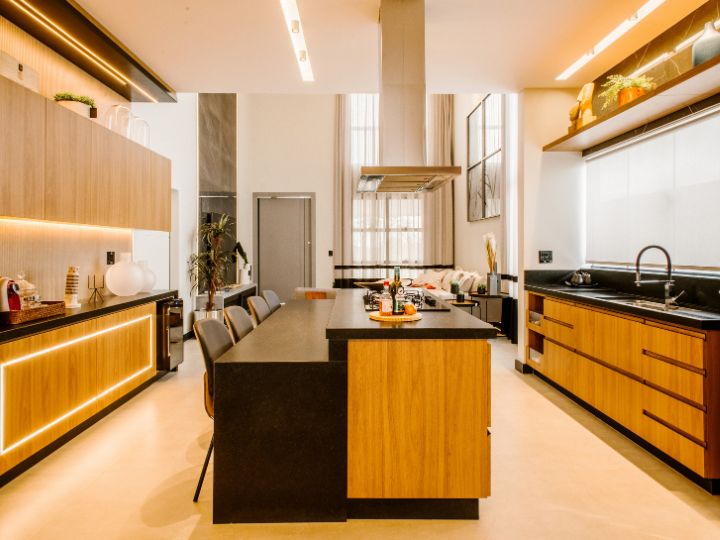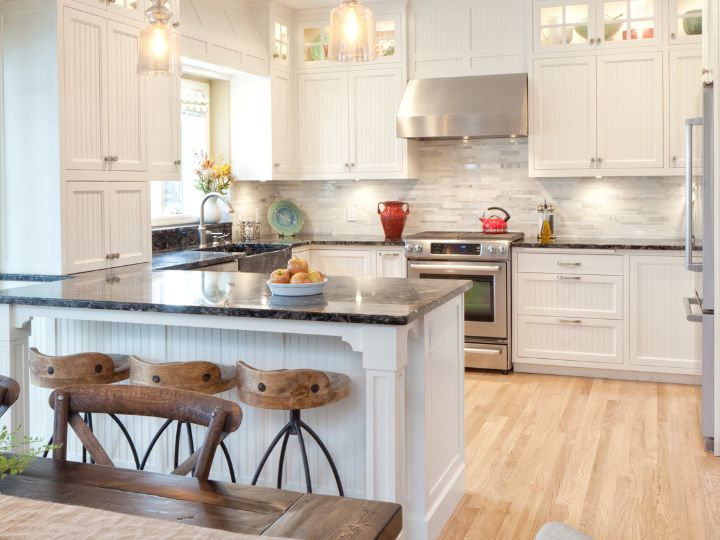
Kitchen Remodeling Permits in Grand Rapids: Everything You Need to Know

Planning a kitchen remodel in Grand Rapids, Michigan? Understanding the permit requirements is crucial for ensuring your project meets local building codes, protects your investment, and avoids costly delays. This comprehensive guide covers everything you need to know about kitchen remodeling permits in the Grand Rapids area.
Why Kitchen Remodeling Permits Matter
Building permits ensure the work meets community standards as defined in the Michigan residential building code and the City of Grand Rapids Zoning Ordinance. Kitchen remodeling permits serve several critical purposes:
Safety and Code Compliance: Permits ensure that all electrical, plumbing, and structural work meets current safety standards, protecting your family and future occupants from potential hazards like electrical fires, water damage, or structural failures.
Legal Protection: Michigan builders who do not acquire permits for their projects face hefty penalties and jail time. Homeowners can also face consequences when unpermitted work is performed, including fines and enforcement actions that may require removal of completed work.
Property Value Protection: Unpermitted work can significantly impact your home's value and marketability. When selling your home, potential buyers and their inspectors will likely inquire about permits for major renovations. Unpermitted work often deters buyers and can complicate the sale process.
Insurance Coverage: Many insurance policies may not cover damages related to unpermitted work, leaving homeowners financially vulnerable in case of issues.
When You Need a Kitchen Remodeling Permit in Grand Rapids
If you are planning a remodel or repair to your single-family home or 2-family duplex, you will need to apply for a residential building permit. In Grand Rapids, kitchen remodeling permits are typically required for:
Electrical Work
- Installing new circuits or upgrading the electrical panel
- Adding new outlets, switches, or lighting fixtures
- Relocating existing electrical components
- Installing under-cabinet lighting or pendant lights
- Adding electrical connections for new appliances
Plumbing Modifications
- Moving or installing new water supply lines
- Relocating or adding new drain lines
- Installing new sinks, dishwashers, or ice makers
- Adding or modifying gas lines for ranges or cooktops
- Installing instant hot water dispensers or water filtration systems
Structural Changes
- Removing or modifying load-bearing walls
- Installing new support beams or posts
- Creating new openings for pass-throughs or islands
- Modifying floor joists or ceiling structures
- Adding new windows or skylights
HVAC Work
- Installing new ventilation systems or range hoods
- Modifying existing ductwork
- Adding or relocating heating elements
- Installing new exhaust fans
Minor Work That May Not Require Permits
Some cosmetic updates typically don't require permits, including:
- Painting walls or cabinets
- Installing new cabinet hardware
- Replacing countertops with the same footprint
- Installing new flooring over existing surfaces
- Updating cabinet doors and drawer fronts
Types of Permits for Kitchen Remodels
Kitchen renovations in Grand Rapids may require multiple types of permits:
Building Permit
The primary permit for structural changes, cabinetry installation, and overall renovation work. Other permits may be required (electrical, mechanical, plumbing).
Electrical Permit
Required for any electrical work, from simple outlet additions to complete rewiring. This ensures all electrical work meets the National Electrical Code and local requirements.
Plumbing Permit
Necessary for any modifications to water supply, drainage, or gas lines. This includes moving sinks, installing new appliances with water connections, or adding gas lines for cooking appliances.
Mechanical Permit
Required for HVAC work, including new ventilation systems, ductwork modifications, or exhaust fan installations.
Land Use/Soil Erosion Control Permit
A land use - soil erosion control permit will be needed if you are within 500 feet of a lake, river, stream, or open drain. This is particularly relevant for homes near the Grand River or other water bodies in the area.
The Grand Rapids Permit Application Process
Step 1: Plan Development
Before applying for permits, you'll need detailed construction plans showing:
- Existing and proposed layouts
- Electrical and plumbing locations
- Structural modifications
- Material specifications
- Equipment schedules for appliances
Step 2: Application Submission
Homeowner considerations: We recommend homeowners applying for their own permit to stop in to apply in person. Licensed contractors please use whichever method you're most comfortable with.
Applications can be submitted:
- In person at the Grand Rapids Development Center
- Online through the Grand Rapids Online Portal
- By mail (for certain permit types)
Step 3: Plan Review
City officials review submitted plans to ensure compliance with:
- Michigan Residential Building Code
- City of Grand Rapids Zoning Ordinance
- Local fire and safety codes
- ADA accessibility requirements where applicable
Step 4: Permit Issuance
Once approved, permits are issued with specific conditions and inspection requirements. The permit must be posted visibly at the job site throughout the project.
Step 5: Inspections
Various inspections are required throughout the project:
- Rough-in inspections: After electrical, plumbing, and HVAC rough-in work
- Framing inspection: For any structural modifications
- Insulation inspection: Before drywall installation
- Final inspection: Upon project completion
Permit Costs and Timeline
Typical Permit Fees
The cost of a basement permit varies based on the scope of the project. Fees typically range from $50 to $500, depending on the work being done and the inspections required. Kitchen remodeling permits in Grand Rapids generally follow similar fee structures:
- Basic building permit: $100-$300
- Electrical permit: $50-$150
- Plumbing permit: $75-$200
- Mechanical permit: $50-$125
- Plan review fees: Additional charges based on project complexity
Processing Timeline
- Simple permits: 1-2 weeks
- Complex renovations: 2-4 weeks
- Projects requiring multiple permits: 3-5 weeks
Factors that can extend timeline include:
- Incomplete application materials
- Complex structural modifications
- Historic district requirements
- Need for variances or special approvals
Working with Contractors and Permits
Licensed Contractor Requirements
Permits can be applied for by the homeowner if the work will be completed by the homeowner. If not, a licensed contractor / builder is required to obtain the permit and complete the work.
Benefits of working with licensed contractors for permits include:
- Familiarity with local building codes
- Established relationships with city inspectors
- Experience with the application process
- Professional liability insurance
- Warranty on work performed
Choosing the Right Contractor
For complex renovations requiring multiple permits, experienced local contractors like Thornapple Construction can provide valuable guidance. Their familiarity with Grand Rapids building codes and permit processes can help ensure smooth project execution and compliance with all local requirements.
When selecting a contractor for your kitchen remodel, consider:
- Local Experience: Choose contractors familiar with Grand Rapids building codes and permit processes
- Portfolio and References: Review past kitchen remodeling projects and client testimonials
- Licensing and Insurance: Verify current licenses and adequate insurance coverage
- Communication: Look for contractors who clearly explain the permit process and timeline
Special Considerations for Grand Rapids
Historic Districts
Properties within Grand Rapids' historic districts require additional review and permits. The Historic Preservation Commission must approve exterior changes before standard permits can be issued. This affects kitchen projects involving:
- Window replacements or modifications
- Exterior door changes
- Structural modifications visible from the street
- Addition of exterior venting or equipment
Neighborhood-Specific Requirements
Different areas of Grand Rapids may have additional requirements:
- Heritage Hill: Additional historic preservation reviews
- East Grand Rapids: Administered through Cascade Township
- Waterfront Properties: Additional environmental considerations
- High-density Areas: Parking and access considerations
Common Permit Challenges and Solutions
Challenge: Incomplete Applications
Solution: Work with experienced contractors who understand required documentation, or thoroughly review city requirements before submitting applications.
Challenge: Structural Discoveries During Construction
Solution: Build flexibility into your timeline and budget for potential structural issues that may require permit modifications.
Challenge: Inspection Failures
Solution: Ensure all work is completed to code before requesting inspections. Address any issues promptly and schedule re-inspections as needed.
Challenge: Neighbor Complaints
Solution: Communicate with neighbors about your project timeline and follow all permit conditions regarding work hours and site maintenance.
DIY vs. Professional Installation
When to Consider DIY
Homeowners may handle permit applications for:
- Simple cosmetic updates
- Minor electrical work (with proper permits)
- Non-structural modifications
When Professional Help is Essential
Professional contractors are recommended for:
- Complex structural modifications
- Major electrical or plumbing work
- Projects requiring multiple permits
- Historic district properties
- Large-scale renovations
The Role of Inspections
Inspection Schedule
Proper planning ensures inspections don't delay your project:
- Pre-construction meeting: Discuss project scope with inspector
- Rough-in inspections: Before concealing any work
- Progress inspections: At key milestones
- Final inspection: Upon project completion
Preparing for Inspections
- Ensure work area is clean and accessible
- Have permits and plans available on-site
- Address any previous inspection comments
- Be available to answer inspector questions
Budget Planning for Permits
Including Permit Costs in Your Budget
Permits in Grand Rapids are straightforward, but they still add to the overall budget. When planning your kitchen remodel budget:
- Add 1-2% of total project cost for permits
- Include potential re-inspection fees
- Budget for plan modification costs if needed
- Consider expedited processing fees if timeline is critical
Hidden Costs to Consider
A few expenses tend to catch homeowners off guard if not planned for: A smart move? Set aside 10–15% of your budget for the unexpected.
Additional costs may include:
- Plan revision fees
- Additional inspections due to changes
- Structural engineering reports
- Environmental assessments
- Utility connection fees
Avoiding Common Permit Mistakes
Documentation Errors
- Incomplete application forms
- Missing required plans or specifications
- Incorrect property information
- Unsigned documents
Timeline Mistakes
- Not accounting for permit processing time
- Scheduling work before permit approval
- Missing inspection appointments
- Not coordinating multiple permits
Code Compliance Issues
- Using non-approved materials
- Deviating from approved plans
- Inadequate structural support
- Improper electrical or plumbing work
Benefits of Proper Permitting
Long-term Value Protection
Properly permitted kitchen remodels:
- Maintain home insurance coverage
- Support property value increases
- Provide documentation for future sales
- Ensure safety for your family
Peace of Mind
Remember, proper permits protect your investment and ensure your home renovation meets safety standards. Knowing your kitchen remodel meets all code requirements provides confidence in your investment and peace of mind for your family's safety.
Working with Thornapple Construction
For homeowners in the Grand Rapids area, Thornapple Construction offers comprehensive kitchen remodeling services with extensive experience in local permit requirements. Their team understands the intricacies of Grand Rapids building codes and can guide you through every step of the permit process.
Services Include:
- Kitchen Remodeling with full permit handling
- Bathroom Remodeling with code compliance expertise
- Home Additions Services for expanding your living space
- Comprehensive permit application and management
- Code-compliant construction practices
- Local inspection coordination
Why Choose Professional Help: While the process may seem daunting, understanding these requirements helps create a smoother renovation experience in Grand Rapids. Working with experienced local contractors ensures your project moves forward efficiently while meeting all regulatory requirements.
Kitchen remodeling permits in Grand Rapids are an essential part of any significant renovation project. While the process may seem complex, understanding the requirements and working with experienced professionals can ensure your project proceeds smoothly and safely.
Key takeaways for Grand Rapids homeowners:
- Most kitchen remodels requiring electrical, plumbing, or structural work need permits
- Multiple permit types may be required for comprehensive renovations
- Licensed contractors can streamline the permit process
- Proper permitting protects your investment and ensures safety
- Plan permit costs and timeline into your overall project budget
Whether you're planning a simple kitchen refresh or a complete renovation, taking the time to understand and comply with Grand Rapids permit requirements will help ensure your project's success and protect your long-term investment in your home.
For expert guidance on your Grand Rapids kitchen remodeling project and permit requirements, contact local professionals who understand the unique aspects of building codes and regulations in the area. Your dream kitchen is within reach with proper planning and the right team to support your vision.

.svg)
.svg)


